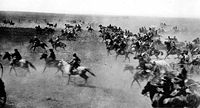What, When, Where, How, Who?
Edwin Powell Hubble
Introduction, Important Definitions and Related Concepts:
Edwin Powell Hubble (November
20, 1889 –
September 28, 1953)
was an
American
astronomer. He profoundly changed astronomers' understanding of the nature
of the universe by demonstrating the existence of other galaxies besides the
Milky Way.
He also discovered that the degree of redshift observed in light coming from a
galaxy increased in proportion to the distance of that galaxy from the Milky
Way. This became known as
Hubble's law, and would help establish that the universe is expanding. He
was born to an insurance executive in
Marshfield, Missouri and moved to
Wheaton, Illinois in 1898. In his younger days he was noted more for his
athletic prowess than his intellectual abilities, although he did earn good
grades in every subject except for spelling. He won seven first places and a
third place in a single high school track meet in 1906. That year he also set a
state record for
high jump
in Illinois.
His studies at the
University of Chicago concentrated on mathematics, astronomy, and philosophy
which led to a
BS degree in 1910. November is the eleventh
month of the
year in the
Gregorian Calendar and one of four Gregorian months with the length of 30
days. November
retained its name (from the Latin novem meaning "nine")
when January
and February
were added to the
Roman calendar. The
birthstone for November is either
topaz or
citrine and
the
birthflower is the
chrysanthemum. November begins in western tropical astrology with the sun in
the sign of
Scorpio and ends in the sign of
Sagittarius (astrology). Astronomically speaking, the sun actually begins in
the constellation of
Libra, passes through
Scorpius
from approximately the 24th through the 29th and ends in the constellation of
Ophiuchus,
which is the only zodiacal constellation that is not associated with an
astrological sign. November starts on the same day of the week as both
February
and March in
common years. A poem which is often told in schools in the
United Kingdom is
"No" by
Thomas
Hood, playing on how the name "November" can be extended to other phrases
beginning with no. Hood's poem suggests that melancholy moods associated with
this month.
All Saints' Day (formerly All Hallows Day), a
Christian holy day, is celebrated on
November 1,
the day after
Halloween. 20 (twenty) is the
natural number following
19
and preceding
21.
A group of twenty units may also be referred to as a score.[1]
Twenty is a
composite number, its proper
divisors
being 1,
2,
4,
5
and
10. Skipping 2 and adding the other divisors gives 20, hence 20 is a
semiperfect number, and since it is not divisible by any of the smaller
semiperfect numbers, it is a
primitive semiperfect number. 20 is the smallest
abundant number that is not a multiple of 3. 20 is the second positive
integer with a prime factorization of the form
 ,
where q is a prime. Its
aliquot sum is 22, and its
aliquot sequence is (20,22,14,10,8,7,1,0). It is also the sum of the first
four
triangular numbers, making it a
tetrahedral number. 20 is the total number of digits on the human body,
which makes it a convenient number system
radix; such
number systems are called
vigesimal.
Year 1889 (MDCCCLXXXIX)
was a
common year starting on Tuesday (link will display the full calendar) of the
Gregorian calendar (or a
common year starting on Sunday of the 12-day slower
Julian calendar). January - March
,
where q is a prime. Its
aliquot sum is 22, and its
aliquot sequence is (20,22,14,10,8,7,1,0). It is also the sum of the first
four
triangular numbers, making it a
tetrahedral number. 20 is the total number of digits on the human body,
which makes it a convenient number system
radix; such
number systems are called
vigesimal.
Year 1889 (MDCCCLXXXIX)
was a
common year starting on Tuesday (link will display the full calendar) of the
Gregorian calendar (or a
common year starting on Sunday of the 12-day slower
Julian calendar). January - March
- January 1 - Total eclipse of the sun, seen over parts of California and Nevada. January 4 An Act to Regulate Appointments in the Marine Hospital Service of the United States signed by Pres. Grover Cleveland. Establishes a Commissioned Corps of officers as a predecessor to the current US Public Health Service Commissioned Corps. January 8 - Herman Hollerith receives a patent for his electric tabulating machine January 22 - Columbia Phonograph is formed in Washington, DC. January 30 - Crown Prince Rudolf of Austria and his mistress Baroness Mary Vetsera commit a double suicide (or a murder suicide) in Mayerling hunting lodge. February 5 - First issue of Glasgow University Magazine is published. February 11 - Meiji Constitution of Japan adopted; 1st Diet convenes in 1890. February 22 - President Grover Cleveland signs a bill admitting North Dakota, South Dakota, Montana and Washington as U.S. states.
March - German naval force shells a village in Samoa, destroying some American property. Three American warships enter the Samoan harbor and were prepare to fire on the three German warships found there. Before guns are fired, a hurricane blows up and sinks all the ships, American and German. A compulsory armistice is called because of the lack of warships.
- March 4 - Grover Cleveland, 22nd President of the United States (1885 - 1889) is succeeded by Benjamin Harrison (1889-1893). March 9 - Yohannes IV is killed in the Battle of Metemma; Sudanese forces, who had been almost defeated, rally and destroy the Ethiopian army. March 11 - North Carolina Legislature issues a charter for the creation of Elon College. March 23 - Mirza Ghulam Ahmad founded the Ahmadiyya Muslim community. March 31 - The Eiffel Tower is inaugurated (opens May 6). Contemporary critics regard it aesthetically displeasing.
[edit]April - June
- April 10 - Hammarby Roddförening was founded.
April 22 - At high noon, thousands rush to claim land in the Land Run of 1889. Within hours the cities of Oklahoma City and Guthrie are formed with populations of at least 10,000.
- May 2 - Menelik II, Emperor of Ethiopia, signs a treaty of amity with Italy, giving Italy control over what will become Eritrea. May 6 - Eiffel Tower opens, in Paris. May 15 - In Samoa, three US and three German ships sink in a typhoon because the captains refuse to leave before the others - almost 200 drown. British steamer Calliope saves itself by pushing into the wind with full speed. May 31 - South Fork Dam collapses in western Pennsylvania, killing more than 2,200 people in and around Johnstown, Pennsylvania; the Johnstown Flood. June 3 - The first long distance electric power transmission line in the United States is completed, running 14 miles between a generator at Willamette Falls and downtown Portland, Oregon. June 6 - The Great Seattle Fire ravages through the downtown area without any fatalities. June 8 - The Wall Street Journal is established. June 12 - 88 are killed in the Armagh rail disaster near Armagh in Northern Ireland. Month of June - Vincent Van Gogh paints Starry Night.
[edit]July - September
- July 8 - The first issue of the Wall Street Journal is published. July 31 - Louise, Princess Royal and Duchess of Fife marries Alexander Duff, 1st Duke of Fife August 14 - The Great London Dock Strike breaks out in England. August 15 - The oldest football club of Asia, Mohun Bagan AC established in Kolkata. August - The Jewish Settlement of Moisés Ville is founded in Argentina. September 10 - Albert Honoré Charles Grimaldi becomes Reigning Prince Albert I of Monaco. September 23 - Nintendo Koppai (Later Nintendo Company, Limited) founded by Fusajiro Yamauchi to produce and market the playing card game Hanafuda.
[edit]October - December
- October 2 - In Washington, DC, the first International Conference of American States begins. October 24 - Sir Henry Parkes, Premier of New South Wales, delivers the Tenterfield Oration calling for the Federation of Australia. November 2 - North Dakota and South Dakota are admitted as the 39th and 40th U.S. state. November 8 - Montana is admitted as the 41st U.S. state. November 11 - Washington is admitted as the 42nd U.S. state.

